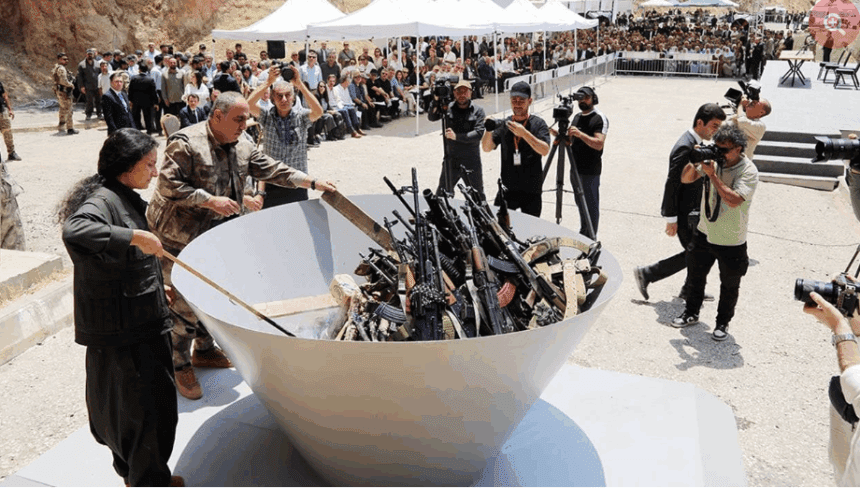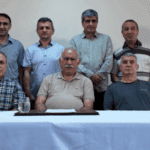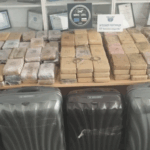The Kurdistan Workers’ Party (PKK), designated as a terrorist organization by Turkey, the United States, and the European Union, took its most significant step yet toward ending a nearly 40-year armed insurgency by holding a symbolic disarmament ceremony in northern Iraq on July 11. The group declared its readiness to return to Turkey and engage in legal political activity, contingent on constitutional reforms and the release of its imprisoned leader, Abdullah Öcalan.
The ceremony, held near Casana Cave in Sulaymaniyah — in the Kurdistan Regional Government (KRG)-controlled territory — featured 30 PKK members, equally split between men and women, placing their weapons into a large cauldron to be incinerated. The weapons reportedly included 26 Kalashnikov rifles, a sniper rifle, an M4, an RPG launcher, and a Bixi machine gun.
The act was closely watched by nearly 200 journalists and a 150-person delegation of politicians, civil society figures, peace activists, and lawmakers, including senior representatives of the pro-Kurdish Peoples’ Equality and Democracy Party (DEM Party).
While the ceremony itself was symbolic, its political message was clear and direct: the PKK is willing to transition into peaceful civilian politics — but only if the Turkish state enacts binding legal reforms and allows its leadership, particularly Öcalan, to play a central role in the process.
Besê Hozat: “We Are Ready to Return, But Not Unprotected”
The clearest articulation of this political shift came from Besê Hozat, co-chair of the KCK (Kurdistan Communities Union) Executive Council and one of the most senior female commanders in the movement. In remarks delivered to international media, Hozat emphasized both the PKK’s readiness and the conditional nature of their decision:
“We are ready and willing to return to Turkey to engage in democratic politics. But this must happen within a legal and political framework that ensures our safety and participation. Without such guarantees, we would be returning to prison cells or worse — to our deaths.”
Hozat further underlined the centrality of Öcalan’s release, calling it a “non-negotiable” condition for any lasting peace:
“Leader Apo must be freed to lead this process. His physical and political freedom is essential for managing the transition. Without him, the process will lack legitimacy and will likely fail.”
From Weapons to Words: A Strategic Transformation
The PKK’s declaration marks not just a pause in hostilities but what its leadership describes as a full ideological shift. In a statement read by the Peace and Democratic Society Group during the ceremony, the group proclaimed:
“We destroy our weapons of our own free will to continue the struggle for freedom, democracy, and socialism through democratic politics and legal avenues. This act is a gesture of goodwill — not surrender.”
The group called for a “democratic integration law” to allow former fighters to return home without the threat of criminal prosecution, and for inclusive reforms that would enable full Kurdish participation in the Turkish political system.
While this is not the first time the PKK has explored a political path — previous peace talks between 2013 and 2015 ultimately collapsed — observers note that this marks the most public and structured effort yet to convert the movement’s base toward civilian political life.
Ankara’s Quiet Approval and Public Vigilance
The Turkish government, which has historically approached such moves with suspicion, responded with cautious optimism. A senior Turkish official, speaking to reporters, confirmed that the disarmament ceremony marks the third phase in a five-stage peace roadmap. The earlier phases included political appeals for peace by the ruling coalition and Öcalan’s call for dissolution in February.
The final two stages, according to officials, will involve the legal reintegration of militants, the creation of return mechanisms, and broader reconciliation policies aimed at healing the societal wounds of the long-standing conflict.
President Recep Tayyip Erdoğan, in a social media post, welcomed the development, calling it “an important step on the road to a terror-free Turkey.”
Nationalist Movement Party (MHP) leader Devlet Bahçeli, who made headlines last year by unexpectedly urging Öcalan to declare an end to violence, also praised the ceremony.
“The positive and reassuring developments we are witnessing today mark a new era,” Bahçeli said. “This is a milestone. A terror-free Turkey is within reach.”
Meanwhile, DEM Party Deputy Speaker Pervin Buldan reportedly held congratulatory phone calls with both Erdoğan and Bahçeli, expressing satisfaction with the progress and pledging her party’s continued support for peaceful resolution efforts.
Challenges Ahead: The Öcalan Dilemma and Public Opinion
Despite the ceremony’s powerful symbolism, deep challenges remain. The demand for Öcalan’s release is likely to provoke sharp debate within Turkish society, especially among nationalist circles and families affected by PKK violence. Public opinion remains highly divided, and the opposition İYİ Party has already declined to participate in the parliamentary commission overseeing the transition.
Moreover, the question of justice and accountability hangs over the process. What happens to militants implicated in attacks? Can blanket amnesty be granted without undermining the rule of law? How will victims’ families be included in reconciliation efforts?
These issues are expected to be debated in Parliament as early as this month, as lawmakers prepare to establish a multi-party commission tasked with drafting legislative frameworks for reintegration and post-conflict justice.
Justice Minister Yılmaz Tunç and Foreign Minister Hakan Fidan have both signaled support for the process — but with conditions.
“We must remain vigilant,” Fidan said. “Until every structure and every individual affiliated with terrorism ceases to be a threat, our security forces will remain on alert.”
From Mountains to Parliament?
The image of Besê Hozat dropping her weapon into a fire — a longtime guerrilla leader now calling for legal political integration — captured the complexity of the moment. For many, it represents both hope and hesitation. Is this the beginning of a durable peace or another fragile ceasefire destined to collapse?
Still, the message was clear: the PKK is signaling that it no longer seeks to fight with guns, but with votes, voices, and political legitimacy.
“We are not abandoning our ideals,” Hozat said. “We are transforming how we struggle for them. We want to build a democratic Turkey — not through war, but through politics.”



